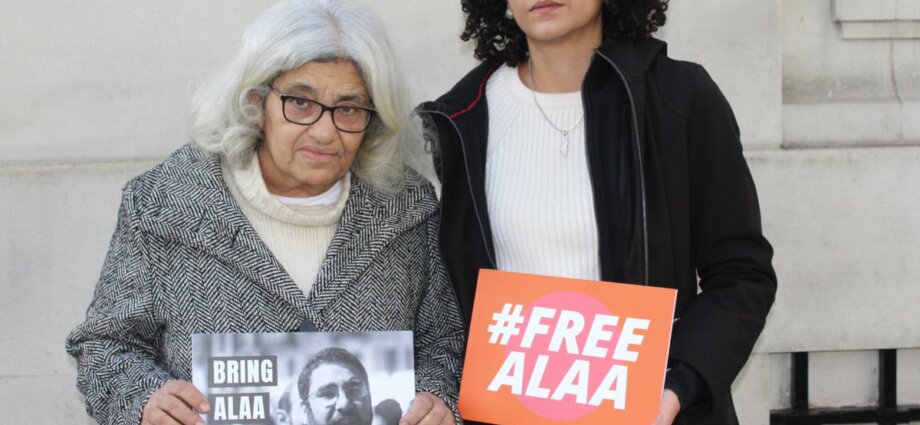The mother of a jailed British-Egyptian activist has not had a meal for close to a month – a hunger strike that she hopes will lead to her son’s release before she starves to death.
Laila Soueif, a 68-year-old maths professor born in London but who now lives in Cairo, is in the UK to call for Alaa Abdel Fattah’s release.
Fattah, 42, is one of Egypt’s most prominent pro-democracy voices and has spent much of the last decade in prison. In 2021, he was charged with spreading false news for sharing a Facebook post about torture in Egypt, having already spent more than two years in pretrial detention. He had also already served five years on similar charges between 2014 and 2019. Human rights groups, including Amnesty International, have decried the charges and called his trials a sham.
His mother has been on hunger strike since a day after Fattah’s second five-year sentence ended on 29 September without his release.The Egyptian government has justified keeping Mr Fattah in prison by claiming his pre-trial detention does not count towards his time served.
“I hope I won’t die in this attempt,” says Soueif during a sit down with The Independent, her daughter Sanaa Seif and Fattah’s cousin, Omar Robert Hamilton.
“I don’t particularly want to leave my children with the memory of a martyred mother,” she says, talking about existing on water, rehydration salts, sugarless tea or coffee, and cigarettes. She adds that she is feeling fine, “but I know the other part is coming”, a reference to when her starving body will start to consume her muscle tissue for energy. Her daughter winces next to her as she speaks.
Soueif gets to see Fattah, whose 13-year-old son, Khaled, lives in Brighton, for 20 minutes once a month. She says Fattah remains as positive as he can in prison but refuses to talk about the future.

“If you try to talk to Alaa about the future, he refuses to engage in that,” she says. “He says things like: ‘You might as well plan Khaled’s life as an orphan. There is no point in planning for anything else.’”
Soueif and her family had been hopeful that the foreign secretary, David Lammy, would be able to get Fattah free, as the politician had been an outspoken advocate for the activist’s release while in the shadow cabinet. He was on record six times calling for the activist’s release between 2021 and becoming foreign secretary, urging previous Conservative governments to do more to ensure Fattah’s freedom.
But since Lammy has entered Whitehall, the family say they have been disappointed by his approach.
“We thought things would be different [when he came into office], that we would have a partnership,” says Hamilton. “Instead, we have continued to be treated as someone to be kept on the outside.”
Soueif says she understands that Mr Lammy has a lot in his in-tray but urges him to at least “pick up the phone” to her.
Asked what she made of Mr Lammy now, she laughs sardonically. “We have this joke in Arabic: ‘You are not you when you are a minister’,” she says.
Lammy met with Fattah’s sisters Sanaa and Mona Seif earlier this month, days after they accused him of “ignoring” them since coming to office.
During the meeting, he promised to keep advocating for their brother but failed to mention that he had discussed the possibility of a British-Egyptian investment conference during a meeting with his counterpart from Cairo towards the end of September. That information only became public after the Egyptian presidential council announced the possibility of a conference on Facebook.
“They say nothing is going on but then, all of sudden, we see that there is a trade summit,” says Seif, visibly frustrated.
“This just makes it more dangerous for Alaa,” says Hamtilon. “Because [Egypt] now understands that [the UK] is just gonna raise [Fattah’s case] but nothing else is going to happen.”
In a response questions from The Independent about Fattah’s imprisonment, the Foreign Office said they “continued to raise” the activist’s case with the Egyptian authorities. They referenced meetings between Lammy and his Egyptian counterpart, Badr Abdelatty, but did not mention a future bilateral summit.
“Our priority remains securing consular access to Fattah and his release,” a sokesperson said. “We continue to raise his case at the highest levels of the Egyptian government.”
Soueif says this politicking and diplomacy seems only to be delaying her son’s release. That is why, she says, she has decided to go on a hunger strike.
“He isn’t going to get out at this point,” she says. “So, I decided to do this to add a sense of urgency to the situation.”











